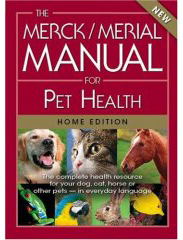 Update: Butch is home!
Update: Butch is home!
Butch the desert tortoise is missing and it’s feared he was stolen. He has been cared for by two generations of the Carle family of Cupertino, CA and before that he belonged to a third person. This desert tortoise is a beloved member of the family who hibernates in a toolbox in the couple’s closet and has an independent streak. The family thinks Butch was taken while Penny Carle was in the hospital.
I grew up with rescued box turtles and I have to agree that they can have personalities. My parents still have one named Big Momma who is very sweet and is at least 30 yrs. old.

 We picked up a copy of The Merck/Merial Manual for Pet Health for $13.99 at Costco last night. I don’t know if all Costcos have it, but it’s worth checking out. The regular price is $22.95 and Amazon charges $21.95 with shipping.
We picked up a copy of The Merck/Merial Manual for Pet Health for $13.99 at Costco last night. I don’t know if all Costcos have it, but it’s worth checking out. The regular price is $22.95 and Amazon charges $21.95 with shipping.